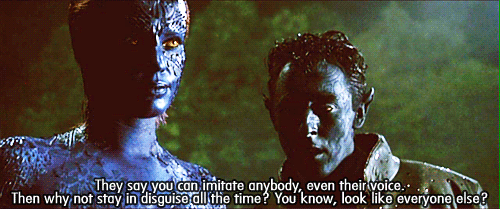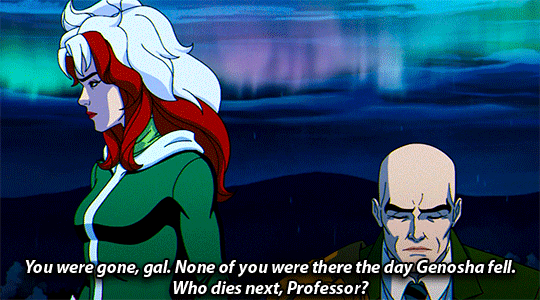“Other”-Ness in Cinema Represented by Fictional Groups - Part I: Mutants
I’m going to be honest– I’m not the best person to write this blog. I’m a white, cisgender, heterosexual, Christian man who, for a majority of my life, believed in pretty Conservative values. Granted, I’m very Liberal now, and I sort of look at my past set of values as embarrassing, but that doesn’t change the fact that I’m the most non-minority you could possibly think of as an individual; however I think my more unique perspective as someone who’s progressed past a Conservative viewpoint to a Liberal viewpoint while still keeping something akin to my original personality will give me a better insight into films that, let’s be honest, are made for broad appeal.
Wolverine’s first usage of his claws in live-action; a scene that shall live in infamy in many a nerd’s mind. However, the film’s director, Bryan Singer, was adamant in not allowing comic books on-set so as to not make the film too “silly” for modern audiences. (Which, in my honest opinion, is dumb.)
(X-Men)
So what do I mean when I say, “‘Other’-ness in cinema, represented by fictional groups?” Well, I mean groups like Mutants in the X-Men films. That will be the biggest example, probably, and the easiest to reference, as a presentation I did in school was just on this whole concept; the idea that Mutants are a marginalized and oppressed peoples due to the simple fact that (a.) they are different from what is widely considered “normal” in society and (b.) they simply exist. These ideas and concepts are touched upon in nearly every X-Men film, spanning from the original released in 2000 to the most recent blockbuster bomb in 2020, The New Mutants.
Nightcrawler, the one on the right, is asking Mystique this question. Her response? “Because we shouldn’t have to.”
(X2: X-Men United)
Hell, even before that 2000 film, there was an animated show on FoxKids, X-Men: The Animated Series, that would teach children that treating people based on their appearance, or anything for that matter, besides the content of their character was an inherently wrong thing to do. That show, now revitalized on Disney+ as X-Men ‘97 (the year the original show ended its run on television), is showing a whole new generation the dangers of what judging others based on bigotry will get us.
Pictured is the leader of a Mutant-Hate group, AKA the Friends of Humanity, as he riles up his fellow bigots at the sight of captured X-Man, Jubilee.
(X-Men: The Animated Series)
In just its fifth episode, it had a full-on Mutant genocide, where we see not only the deaths of dozens of side characters (and millions of unnamed Mutants), but also the permanent death of a main X-Man, all because of hatred and anti-Mutant sentiment growing around the world. The showrunner, Beau DeMayo, has stated on his personal Twitter feed (and elaborated on in this Deadline article) that he took inspiration from his own reactions to horrible events like 9/11 and, as he is a gay man, the Pulse Nightclub shooting, a club that he was a regular at, for how to handle the writing of reactions and aftermath of a hate-crime on the level of what was literally a Mutant genocide/massacre.
The Genosha Genocide leads to the fracturing not only of humankind and Mutantkind, but also the X-Men.
(X-Men '97)



